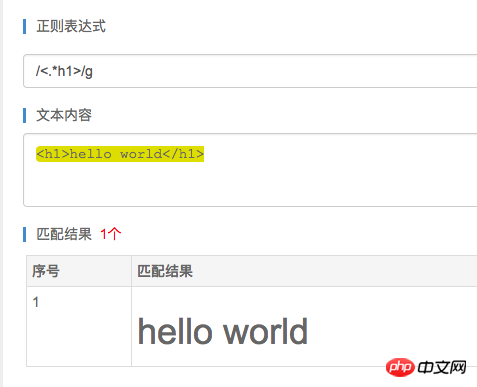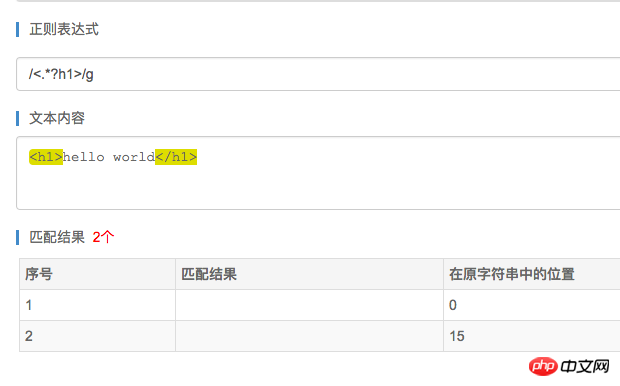
If there is a text, you only want to match the shortest possible one, not the longest one. This article mainly introduces you to the relevant information about the usage of the shortest matching pattern in regular expressions.
Preface
Recently, I wanted to use regular expressions to grab something from a web page. The content was not complicated, but many problems arose. . Not much to say below, let’s take a look at the detailed introduction:
When we use regular expressions to match the beginning and end of a tag, such as matching
hello world The opening and closing tags of h1 in
maybe many people will write like this
/<.*h1>/g
But like this Is it really possible?
Because the * matching character matches zero or more of the previous character, and it is a greedy matching
, so what you get will be the following result.

Obviously this is not what we want, so how to change greedy matching into minimum matching,
/<.*?h1>/g
The above writing method is enough, as shown below:

In fact, the principle should be very simple, because? Also Greedy matching, and can only match 0 to 1,
, so it will end when it matches the first one, thus preventing * from matching multiple greedy ones.
The above content is the usage of the shortest matching pattern in regular expressions. I hope it can help everyone.
Related recommendations:
PHP regular expression collection
Detailed explanation of commonly used functions in php regular expressions
Summary of regular expressions commonly used in php forms
The above is the detailed content of Usage of shortest matching pattern in regular expressions. For more information, please follow other related articles on the PHP Chinese website!
 Summary of java basic knowledge
Summary of java basic knowledge Commonly used expressions in php
Commonly used expressions in php How to light up Douyin close friends moment
How to light up Douyin close friends moment div scroll bar
div scroll bar What are the servers that are exempt from registration?
What are the servers that are exempt from registration? How to delete blank pages in word
How to delete blank pages in word What should I do if the web video cannot be opened?
What should I do if the web video cannot be opened? The difference between WeChat service account and official account
The difference between WeChat service account and official account



